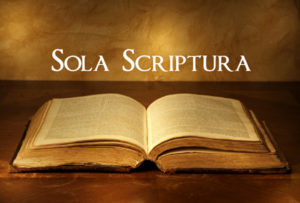 Recently the Board of Trustees at Moody Bible Institute has required that all professors at MBI agree and sign the “Short Statement of the Chicago Statement on Biblical Inerrancy,” as a result of some rightly held concern of “doctrinal shift,” at MBI. You can read about this controversy by Julie Roys HERE, HERE, and HERE for a better understanding of the problems at Moody Bible Institute. Unfortunately, this is not so uncommon in evangelicalism. This is why Sola Scriptura, “Scriptures alone” is so important if we are to protect doctrinal purity.
Recently the Board of Trustees at Moody Bible Institute has required that all professors at MBI agree and sign the “Short Statement of the Chicago Statement on Biblical Inerrancy,” as a result of some rightly held concern of “doctrinal shift,” at MBI. You can read about this controversy by Julie Roys HERE, HERE, and HERE for a better understanding of the problems at Moody Bible Institute. Unfortunately, this is not so uncommon in evangelicalism. This is why Sola Scriptura, “Scriptures alone” is so important if we are to protect doctrinal purity.
It would be nay impossible to read church history and not see the importance of this essential principle of the sole authority of the scriptures. Once this principle is denied it isn’t long that other cardinal truths of the faith, especially those concerning the Gospel are also denied.
“Sola Scriptura” became the “formal principle” of the Reformation upon which the material principle, justification by grace alone (Sola Gratia), through faith alone (Sola Fida) was once again restored. With these came the other two Solas;” Sola Christus (Christ Alone, and “Sola Deo Gloria), to the glory of God alone.
Everywhere you look on the religious landscape, where you see the authority of the scriptures alone denied you find “doctrinal drift,” if not outright denial of the Gospel, and the emergence of other damnable heresies.
So, once again, in response to the influence of liberalism in “Chicago Statement on Biblical Inerrancy” (CSBI) was produced at an international Summit Conference of evangelical leaders, held at the Hyatt Regency O’Hare in Chicago in the fall of 1978. This congress was sponsored by the International Council on Biblical Inerrancy. The Chicago Statement was signed by nearly 300 noted evangelical scholars including James Boice, Norman L. Geisler, John Gerstner, Carl F. H. Henry, Kenneth Kantzer, Harold Lindsell, John Warwick Montgomery, Roger Nicole, J. I. Packer, Robert Preus, Earl Radmacher, Francis Schaeffer, R. C. Sproul, and John Wenham. This landmark document is considered to be the “first systematically comprehensive, broadly based, scholarly, creed-like statement on the inspiration and authority of Scripture in the history of the church.”
The International Council on Biblical Inerrancy disbanded in 1988 after producing three major statements: one on biblical inerrancy in 1978, one on biblical hermeneutics in 1982, and one on biblical application in 1986.
Below, is the shorter statement that some of the professors of Moody Bible Institute protested signing.
- God, who is Himself Truth and speaks truth only, has inspired Holy Scripture in order thereby to reveal Himself to lost mankind through Jesus Christ as Creator and Lord, Redeemer and Judge. Holy Scripture is God’s witness to Himself.
- Holy Scripture, being God’s own Word, written by men prepared and superintended by His Spirit, is of infallible divine authority in all matters upon which it touches: it is to be believed, as God’s instruction, in all that it affirms: obeyed, as God’s command, in all that it requires; embraced, as God’s pledge, in all that it promises.
- The Holy Spirit, Scripture’s divine Author, both authenticates it to us by His inward witness and opens our minds to understand its meaning.
- Being wholly and verbally God-given, Scripture is without error or fault in all its teaching, no less in what it states about God’s acts in creation, about the events of world history, and about its own literary origins under God, than in its witness to God’s saving grace in individual lives.
- The authority of Scripture is inescapably impaired if this total divine inerrancy is in any way limited or disregarded, or made relative to a view of truth contrary to the Bible’s own; and such lapses bring serious loss to both the individual and the Church.[2]
Professor McDuffee of MBI said he subscribes to the summary statements and 19 articles of the Chicago Statement on Biblical Inerrancy, he added, “The CSBI (Chicago Statement on Biblical Inerrancy) means nothing to me. I will sign it, and each time I do my signature will remind me of the wrong done and reopen the wound it inflicted.”[1]
What wrong? What wound? I personally would be proud to sign the affirmation each year in support of the doctrines of inerrancy and the authority of the Scriptures. Is this an issue of pride with the professor? Or maybe, there is another unstated issue.
It cannot be overstated the supreme importance of the inerrancy and authority of the scriptures alone impact on the orthodoxy of the faith once delivered (Jude 3). Upon these principles rests the safety of Christian truth. Once we deny the sole authority of the scriptures, not only are we in danger of heresy, but we also open the door to extra-biblical materials, councils, and teachings that are outside biblical truth.
I’ll write more on this, count on it!
-Michael Holtzinger
[1] http://julieroys.com/moody-professors-protest-will-sign-chicago-statement-means-nothing/
[2] “CHICAGO STATEMENT ON BIBLICAL INERRANCY, The Short Statement”, http://defendinginerrancy.com/chicago-statements/
Some helpful resources
Why Believe the Bible By: John MacArthur
In Defense of the Bible Edited by: Steven B Cowan and Terry L. Wilder
Biblical Authority By: John D. Woodbridge
